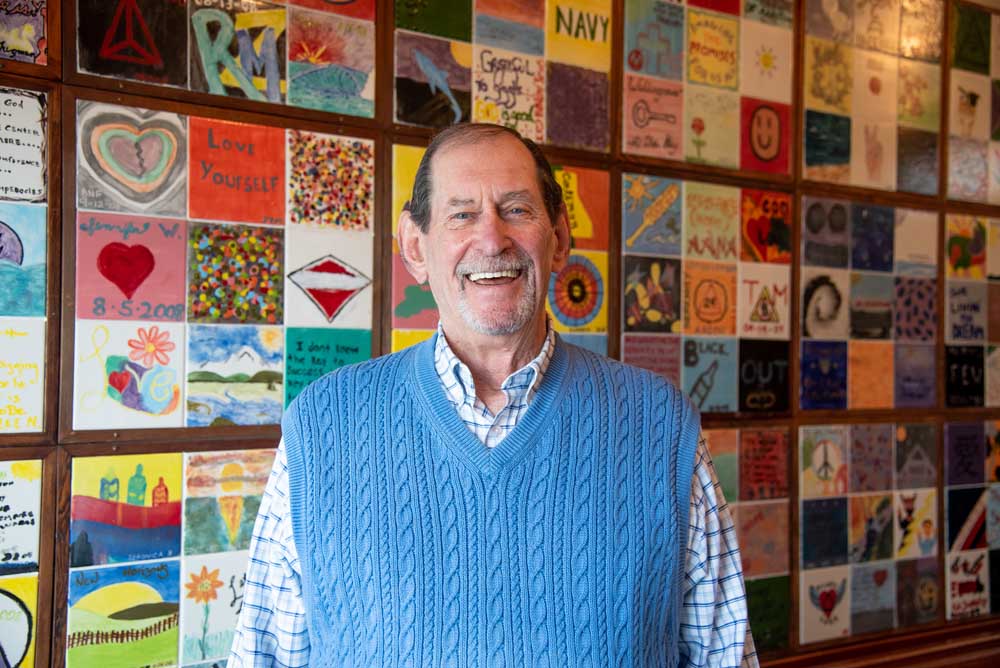Virtue at the Pointe returns recovery to Astoria
Published 12:15 am Wednesday, February 10, 2021

- Milt Parham, the executive director of Virtue at the Pointe, stands in front of a wall of ceramic tiles painted by former patients at Astoria Pointe.
It’s been more than two years since Astoria Pointe admitted patients seeking rehabilitation from drug and alcohol addiction. Tiles made by some of the thousands of patients who sought help over the years still line the main entrance to the expansive complex overlooking Uniontown.
Milt Parham, who worked for Astoria Pointe and recently accepted his first patient as executive director of Virtue at the Pointe, said he hopes to add many more tiles at the new venture.
The first patient was a local Parham knows from other treatment centers in the region. Virtue at the Pointe, while marketing to people with private insurance around the Pacific Northwest, set aside a small number of beds specifically for locals.
“It was very easy to say, ‘Yeah, he’s not a problem. He’s a great guy,’” Parham said. “And getting him in and doing the work is important.”
Virtue at the Pointe is a high-intensity residential treatment facility with 40 beds — 27 for men and 13 for women. Patients spend one to three months in residential care, usually after medically managed detox. The next-closest detox center for women is in Seaside, while men must travel outside Clatsop County.
Parham expects the facility, when full, to employ around 45 people between counselors, nurses, maintenance, kitchen and housekeeping staff. The center still needs to hire a clinical director with a master’s degree to oversee the content of the recovery program and counselors.
“That’s a big piece to hire,” Parham said. “The counselors can work independently. Most of them can take a preexisting program that’s fairly well together and work.”
A 12-step model
Long-term treatment will be largely based around the 12-step program. Parham said the center is also trying to bring in cutting-edge technology, such as targeted transcranial resonance, a procedure that uses brain wave data to treat mental health issues from depression to addiction.
Gevork “George” Boyadzhyan, a recovering alcoholic, is behind Virtue at the Pointe, as well as Virtue Recovery Center in Phoenix. He bought Astoria Pointe in December from Ellie Dooner, the widow of Astoria Pointe founder, William Dooner. Parham said Boyadzhyan is also trying to start another center in Las Vegas.
“He’s an incredibly humble guy who wants to make a difference in the work that he does,” Parham said. “He truly tries to make a difference with his facilities.”
The former Crestview Care Center retirement home reopened in 2006 as Serenity by the Sea, a 30-bed treatment center that lasted less than a year. Dooner, a Memphis businessman and recovering alcoholic who spotted the building during a fishing trip on the Columbia River, bought it and opened Astoria Pointe in 2007. He later added Rosebriar, a 16-bed women’s treatment center in a former bed and breakfast.
Parham was Dooner’s chief operations officer from 2008 to 2011.
By the time he left Astoria Pointe, Parham said, more than half of the patients who had come through during his tenure remained sober. Parham said the key is a rock-solid discharge plan to deal with the fallout from their drug and alcohol abuse — revoked driver’s licenses, impounded cars, foreclosed homes, failed marriages — when leaving the structure of treatment.
Parham has been clean and sober since 1981. Upon leaving treatment, he had scheduled outpatient treatment, weekly Alcoholics Anonymous meetings, doctor visits and therapy sessions for six months afterward to deal with anxiety and depression from a failing marriage without turning to alcohol.
“If we can get 80% to stay sober one year, and 70% of that group to see five years, we’re back doing what they were doing in the ‘70s and ‘80s,” Parham said. “But everything seems to have been built around the revolving door.”
A challenge financially
Inpatient recovery centers, while essential to providing structure for people in recovery, have become challenging financially to operate.
Sunspire Health took over operations at Astoria Pointe after Parham’s departure until closing the facility and Rosebriar without explanation in late 2018.
Klean Treatment Center, based in Los Angeles, fell behind to creditors and closed a 54-bed inpatient treatment center in Long Beach, Washington, in late 2018, along with outpatient services in Astoria. North Coast Recovery, a mostly outpatient center offering some transitional housing for low-income patients, also succumbed to a lack of funding.
Before joining Virtue at the Pointe, Parham was part of an effort with Willapa Behavioral Health to reopen the Long Beach inpatient facility. But the effort has stalled because of issues getting financing.
William Dooner died of cancer in 2017, and Ellie Dooner began selling properties to fund her husband’s dream of an opioid recovery center on a farm she owns near Memphis. The Rosebriar was sold and is being converted partly into a vacation rental. Astoria Pointe nearly became worker dorms for Pacific Seafood before being purchased by Boyadzhyan for recovery.
“I was absolutely devastated when the Rosebriar was closed,” Parham said. “I am thrilled to see this building get utilization as a treatment center. I think it’s going to help the community in many different respects. It will help revitalize the recovery community, which is huge, and the commitment of the community in general to recovery.”





